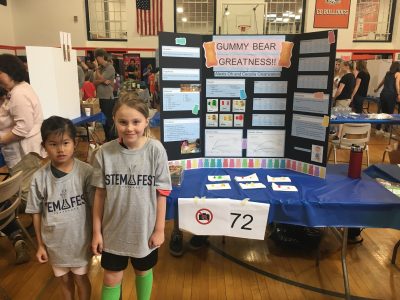Chappaqua Students Gear Up for Virtual STEM Fest on Saturday

When COVID-19 shut down society last March, the Chappaqua STEM Fest was one of the dozens of local events that was forced to be called off.
It was especially disappointing for the more than 200 students who had spent months, in many cases, toiling to present their projects at what had become a day-long districtwide celebration of science since STEM Fest was first held in 2015.
But the event’s organizers weren’t deterred. Chananda Nallan and Dean Rock, the chair and vice chair of the school district’s STEM PTA, respectively, recounted how later last spring they were able to devise a way for students to present their projects.
“We got some people who were science friendly to come in and mentor a couple of teachers and us and get out the word that any student who put their project together, put together a five-minute video, we’ll all sit down and watch it and we’ll make comments and kind of do this as a glorified Zoom call,” Rock said.
About 15 to 20 students participated, and the effort served as a template for this year’s Chappaqua STEM Fest, a virtual science fair that will take place on Saturday. Students will present their projects in three- to five-minute videos that had to be submitted by Mar. 5. Videos can be viewed on a secure platform as students explain to parents, grandparents and friends about their work and research. Faculty, district officials and science-savvy residents will serve as evaluators, providing feedback for the students, most of whom are in grades K-8.
Nallan said moving forward with the virtual event was a chance for the district to highlight the hard work and ingenuity of the participants. For those in seventh and eighth grades, it’s also a chance for them to qualify for next month’s Tri-County Science and Technology Fair, she said.
“Let’s give these kids who want opportunities to see how we can make it as best as possible right now and that’s where we are,” Nallan said.
The projects represent a wide assortment of science categories. Nallan said sometimes research starts with a personal interest that is developed into a project with real-world application. For example, one student has explored the impact of more screen time and video game playing on children during the pandemic. Another is comparing Post-Traumatic Stress Disorder with other sorts of stresses during this period of time, Rock said.
Nallan said some of the younger students’ projects are basic, such as exploring colors, but how well they can understand and explain the science is most important.
“A little kid talks about colors and finds out how rainbows are created and that’s a cute topic, but talking about the science behind it, the spectrum behind it, just makes me very happy to see,” Nallan said.
Although much of the personal interaction is lost in a virtual event, Rock said there are other advantages to be gained for the students. Typically, a student would stand by his or her project the entire day, unable to see what their friends and classmates have presented. It also spares a student having to repeatedly explain or demonstrate their project throughout the day.
Their videos will also remain on the platform for about two weeks.
“We lose the face to face with the kids. The kids lose that,” Rock said. “But now they can go anytime, seven o’clock at night for the next couple of weeks and see their friend’s project and give a comment on it. We’ve made it so families can have access, grandparents, friends of the family can go in and see the kid’s project.”
For the Chappaqua PTA STEM Committee, STEM Fest is the centerpiece of a science event schedule through most of the school year. Each month there is at least one event for some of the students, such as the First Lego League, Destination Imagination, Science Olympiads and various workshops.
Rock said that going forward organizers will likely fuse the in-person and virtual environments to try and capture the best from both formats.
“I think we’ll integrate that somehow when we go back to the physical,” he said. “I think we’ll have a hybrid of the two.”

Martin has more than 30 years experience covering local news in Westchester and Putnam counties, including a frequent focus on zoning and planning issues. He has been editor-in-chief of The Examiner since its inception in 2007. Read more from Martin’s editor-author bio here. Read Martin’s archived work here: https://www.theexaminernews.com/author/martin-wilbur2007/
